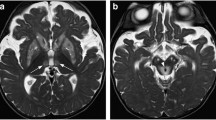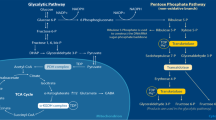Abstract
The objective of this study is to review the presentation, outcome and aetiology of central pontine and extrapontine myelinolysis (CPEPM) in a tertiary hospital center. The study method is a case series and included identification of patients from University of Montreal Health Centre archives database (1995–2007). All diagnoses were confirmed by neuroimaging or brain autopsy. Twelve individuals (25–66 years old) presented heterogeneous manifestations. Co-morbidities included diabetes insipidus (n = 2), haemodialysis (n = 1), cirrhosis (n = 3), gastroenteritis (n = 2) and potomania (n = 1). Aetiologies included rapid correction of severe hyponatremia (n = 6)/acute hypernatremia (n = 1); immediate (n = 2) or remote (n = 1 with recurrent cirrhosis) orthotopic liver transplantation (OLT) with tacrolimus-induced immunosuppression (n = 3); and chronic alcoholism (n = 4, two with hyponatremia). Four individuals died acutely. Two were lost to follow-up. Six had good motor or cerebellar recovery. Neuropsychological evaluations (n = 5/6) revealed a subcortical/frontal dysfunction. Cognitive impairment represented the major remaining lasting sequel (n = 4). Three salient clinical syndromes were observed: (1) predominant cerebellar presentation in individuals with alcoholism (n = 4); (2) significant alteration of consciousness at presentation (n = 4), all resulting in death (OLT, n = 3); (3) seizures persisting after natremia correction (n = 2). Clinical presentation of CPEPM is heterogeneous and can even include seizures. Cognitive impairment should be screened as it is a significant factor limiting return to normal life.

Similar content being viewed by others
References
Adams RD, Victor M, Mancall EL (1959) Central pontine myelinolysis: a hitherto undescribed disease occurring in alcoholic and malnourished patients. AMA Arch Neurol Psychiatry 81:154–172
Adrogue HJ, Madias NE (2000) Hyponatremia. N Engl J Med 342:1581–1589
Ayus JC, Achinger SG, Arieff A (2008) Brain cell volume regulation in hyponatremia: role of sex, age, vasopressin, and hypoxia. Am J Physiol Renal Physiol 295:F619–F624
Castilla-Guerra L, del CF-M, Lopez-Chozas JM, Fernandez-Bolanos R (2006) Electrolytes disturbances and seizures. Epilepsia 47:1990–1998
Kumar SR, Mone AP, Gray LC, Troost BT (2000) Central pontine myelinolysis: delayed changes on neuroimaging. J Neuroimaging 10:169–172
Lampl C, Yazdi K (2002) Central pontine myelinolysis. Eur Neurol 47:3–10
Laureno R, Karp BI (1997) Myelinolysis after correction of hyponatremia. Ann Intern Med 126:57–62
Lee TM, Cheung CC, Lau EY, Mak A, Li LS (2003) Cognitive and emotional dysfunction after central pontine myelinolysis. Behav Neurol 14:103–107
Lim L, Krystal A (2007) Psychotic disorder in a patient with central and extrapontine myelinolysis. Psychiatry Clin Neurosci 61:320–322
Lin CM, Po HL (2008) Extrapontine myelinolysis after correction of hyponatremia presenting as generalized tonic seizures. Am J Emerg Med 26:632–636
Marco S, Cecilia F, Patrizia B (2009) Neurologic complications after solid organ transplantation. Transpl Int 22:269–278
Martin RJ (2004) Central pontine and extrapontine myelinolysis: the osmotic demyelination syndromes. J Neurol Neurosurg Psychiatry 75(Suppl 3):iii22–iii28
Menger H, Jorg J (1999) Outcome of central pontine and extrapontine myelinolysis (n = 44). J Neurol 246:700–705
Mochizuki H, Masaki T, Miyakawa T, Nakane J, Yokoyama A, Nakamura Y, Okuyama K, Kamakura K, Motoyoshi K, Matsushita S, Higuchi S (2003) Benign type of central pontine myelinolysis in alcoholism—clinical, neuroradiological and electrophysiological findings. J Neurol 250:1077–1083
Salgado JV, Costa-Silva M, Malloy-Diniz LF, Siqueira JM, Teixeira AL (2007) Prefrontal cognitive dysfunction following brainstem lesion. Clin Neurol Neurosurg 109:379–382
Schwartzkroin PA, Baraban SC, Hochman DW (1998) Osmolarity, ionic flux, and changes in brain excitability. Epilepsy Res 32:275–285
Sterns RH, Cappuccio JD, Silver SM, Cohen EP (1994) Neurologic sequelae after treatment of severe hyponatremia: a multicenter perspective. J Am Soc Nephrol 4:1522–1530
Strub MU, Steck AJ, Fuhr P (1999) Asymptomatic central pontine myelinolysis. Neurology 53:914
van ZM, de HE, van GJ, Kappelle LJ (2003) Cognitive functioning in patients with a small infarct in the brainstem. J Int Neuropsychol Soc 9:490–494
Vermetten E, Rutten SJ, Boon PJ, Hofman PA, Leentjens AF (1999) Neuropsychiatric and neuropsychological manifestations of central pontine myelinolysis. Gen Hosp Psychiatry 21:296–302
Yu J, Zheng SS, Liang TB, Shen Y, Wang WL, Ke QH (2004) Possible causes of central pontine myelinolysis after liver transplantation. World J Gastroenterol 10:2540–2543
Conflict of interest statement
The authors report no conflicts of interest.
Author information
Authors and Affiliations
Corresponding author
Rights and permissions
About this article
Cite this article
Odier, C., Nguyen, D.K. & Panisset, M. Central pontine and extrapontine myelinolysis: from epileptic and other manifestations to cognitive prognosis. J Neurol 257, 1176–1180 (2010). https://doi.org/10.1007/s00415-010-5486-7
Received:
Revised:
Accepted:
Published:
Issue Date:
DOI: https://doi.org/10.1007/s00415-010-5486-7




